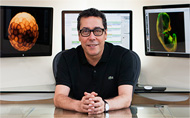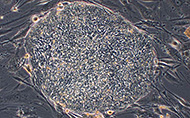Human Pluripotent Stem Cell Resource Center
Services
The Human Pluripotent Stem Cell Resource Center currently provides services in four categories:
1. Training

The Center provides training in basic or advanced stem cell technologies to scientists from The Rockefeller University and Tri-I institutions.
Training is available in:
- Human embryo culture and hESC derivation.
- iPSC derivation from non-diseased as well as diseased patients.
- Genome editing and real-time tracking of hESCs and iPSC-derived embryoids and organoids.
- Differentiation and self-organization of colonies grown in 2D or 3D confined geometry.
Over a dozen laboratories and over 50 trainees have so far used the resource center to learn a broad range of stem cell-related experimental and computational approaches.
2. Consultations, projects, or collaborations

Scientists from the Tri-Institutions can explore the possibility of stem cell projects related to their areas of interest, working with the Center Director and/or members of the Brivanlou Laboratory. Past consultations range from exploratory fact finding and general advice, to specific specialized training requests to support grants projects or publications, referral to extramural associates or resources, and discrete joint projects and collaborations within the Resource Center.
3. Use of facilities

The Resource Center's infrastructure and equipment are available for use and include:
- Derivation hoods for human embryos and microinjection systems including Somatic Cell Nuclear Transfer (SCNT).
- Molecular tools for manipulation, modification, differentiation, and observation of hESCs and iPSCs.
- Micropattern culture systems and 3D technology for self-organizing hESCs and iPSCs.
- Inverted stereo and high magnification fluorescent microscopes for live analysis of cells or embryos.
4. Banking and quality control of discrete and isogenic stem cell lines

The Centers banks more than 100 lines generated at the University as well as a large number of non-diseased and diseased lines generated by other laboratories and sent to the Center for quality control and propagation. This collection is essential to control for differences in readouts that are due to different human genetic backgrounds. The Resource Center also serves as a beta test site for next generation reagents developed by third parties that aim at improving hESCs and iPSCs culture and genetic manipulations.




